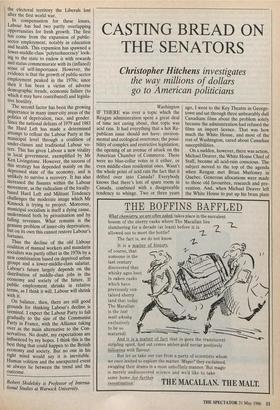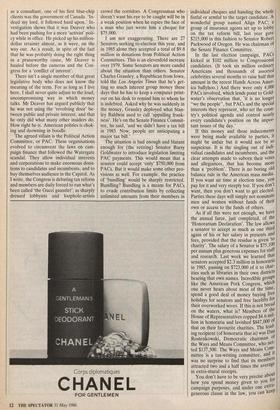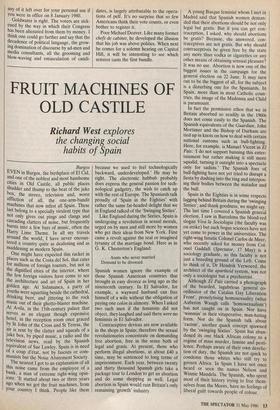CASTING BREAD ON THE SENATORS
Christopher Hitchens investigates
the way millions of dollars go to American politicians
Washington IF THERE was ever a topic which the Reagan administration spent a great deal of time not caring about, that topic was acid rain. It had everything that a hot Re- publican issue should not have: environ- mental and ecological overtones; the possi- bility of complex and restrictive legislation; the opening of an avenue of attack on the American Chamber of Commerce. There were no blue-collar votes in it either, or even middle-class residential ones. Wasn't the whole point of acid rain the fact that it drifted over into Canada? Everybody knows that there's lots of spare room in Canada, combined with a disagreeable tendency to whinge. Two or three years ago, I went to the Key Theatre in George- town and sat through three unbearably dull Canadians films about the problem solely because the administration had refused the films an import licence. That was how much the White House, and most of the rest of Washington, cared about Canadian susceptibilities.
On a sudden, however, there was action, Michael Deaver, the White House Chief of Staff, became all acid-rain conscious. The subject moved to the top of the agenda when Reagan met Brian Murloney in Quebec. Generous allocations were made to those old favourites, research and pre- vention. And, when Michael Deaver left the White House to put up his brass plate
as a consultant, one of his first blue-chip clients was the government of Canada. 'In- deed my lord, it followed hard upon.'. In- vestigation shows that it was Deaver who had been pushing for a more 'activist' poli- cy while in office. He picked up his million- dollar retainer almost, as it were, on the way out. As a result, in spite of the fact that he was probably doing the right thing in a praiseworthy cause, Mr Deaver is hauled before the cameras and the Con- gress for a 'conflict of interest'.
There isn't a single member of that great legislative body who does not know the meaning of the term. For as long as I live here, I shall never quite adjust to the loud, uncompromising way in which money talks. Mr Deaver has argued publicly that he was not using the 'revolving door' be- tween public and private interest, and that he only did what many other insiders do. How right he is. American politics is chok- ing and drowning in boodle.
The agreed villain is the Political Action Committee, or PAC. These organisations evolved to circumvent the laws on cam- paign finance that followed the Watergate scandal. They allow individual interests and corporations to make enormous dona- tions to candidates and incumbents, and to buy themselves audience in the Capitol. As I write, the Congress is debating tax reform and members are daily forced to run what's been called 'the Gucci gauntlet', as sharply dressed lobbyists and loophole-artists crowd the corridors. A Congressman who doesn't want his eye to be caught will be in a weak position when he espies the face of a man who just wrote him a cheque for $75,000.
I am not exaggerating. There are 27 Senators seeking re-election this year, and in 1985 alone they accepted a total of $9.8 million in donations from Political Action Committees. This is an elevenfold increase over 1979. Some Senators are more candid about the situation than others. Senator Charles Grassley, a Republican from Iowa, told the Los Angeles Times that he's get- ting so much interest group money these days that he has to keep a computer print- out on his desk to remind him to whom he is indebted. Asked why he was suddenly in the money, Grassley deployed what Stan- ley Baldwin used to call 'appalling frank- ness'. He's on the Senate Finance Commit- tee, he said, 'and we didn't have a tax bill in 1983. Now, people are anticipating a major tax bill.'
The situation is bad enough and blatant enough for (the retiring) Senator Barry Goldwater to introduce legislation limiting PAC payments. This would mean that a senator could accept 'only' $750,000 from PACs. But it would make some other pro- visions as well. For example, the practice of 'bundling' would be sharply restricted. Bundling? Bundling is a means for PACs to evade contribution limits by collecting unlimited amounts from their members in individual cheques and handing the whole fistful or armful to the target candidate. A wonderful group named Align PAC; a group of insurance agents set up to lobby on the tax reform bill, last year gave $215,000 in this fashion to Senator Robert Packwood of Oregon. He was chairman of the Senate Finance Committee.
In the last election campaign, PACs kicked in $102 million to Congressional candidates. (It took six million ordinary Americans and thousands of assorted celebrities several months to raise half that amount in the recent Hands Across Amer- ica ballyhoo.) And there were only 4,000 PACs involved, which lends point to Gold- water's observation that, 'it is no longer "we the people", but PACs and the special interests they represent, who set the coun- try's political agenda and control nearly every candidate's position on the impor- tant issues of the day.' If this money and these inducements were being made available to parties, it might be unfair but it would not be so suspicious. It is the singling out of indi- vidual candidates and incumbents, and the clear attempts made to suborn their votes and allegiances, that has become more than a 'problem'. There is no boring old balance rule in the American mass media. If you want air time at election time, you pay for it and very steeply too. If you don't want, then you don't want to get elected. Parties these days will simply not nominate men and women without funds of their own or access to the funds of others.
As if all this were not enough, we have the annual farce, just completed, of the `Honorarium Declaration'. The law allows. a senator to accept as much as one third again of his or her salary in presents and fees, provided that the residue is given 'to charity'. The salary of a Senator is $75,100 per annum plus generous expenses for staff and research. Last week we learned that senators accepted $2.3 million in honoraria in 1985, passing on $723,000 of it to char- ities such as libraries in their own districts bearing that own names. Incredible groups like the American Pork Congress, which one never hears about most of the time, spend a good deal of money buying free holidays for senators and free facelifts for their overworked wives. If this is not bread on the waters, what is? Members of the House of Representatives copped $4.6 mil- lion in honoraria and lavished $847,000 of that on their favourite charities. The lead- ing recipient (of honoraria that is) was Dan t Rostenkowski, Democratic chairman 0' the Ways and Means Committee, who net- ted $137,500. The Ways and Means Com- mittee is a tax-writing committee, and it was no surprise to find that its members attracted two and a half times the average in extra-mural receipts. You don't have to be very precise abolit_. how you spend money given to you for how purposes, and under one extra- generous clause in the law, you can keep any of it left over for your personal use if you were in office on 8 January 1980.
Goldwater is right. The voters are sick- ened by the way in which their Congress has been alienated from them by money. I think one could go further and say that the decadence of political language, the grow- ing domination of discourse by ad-men and media consultants, all the grooming and blow-waving and emasculation of candi- dates, is largely attributable to the opera- tions of pelf. It's no surprise that so few Americans think their vote counts, or even bother to register it.
Poor Michael Deaver. Like many former chefs de cabinet, he developed the illusion that his job was above politics. When next he comes for a solemn hearing on Capitol Hill, it will be interesting to see which senator casts the first bundle.




























































 Previous page
Previous page